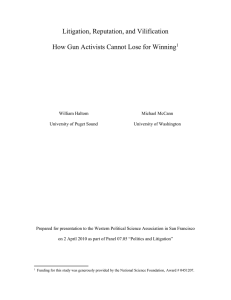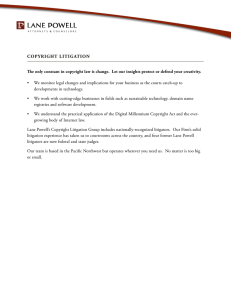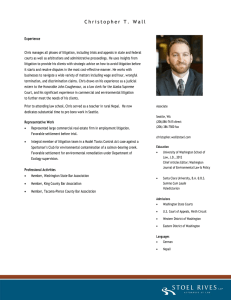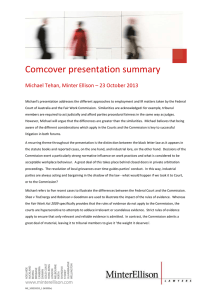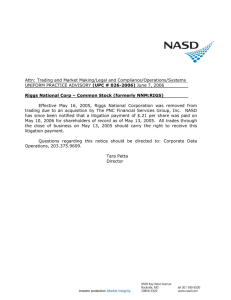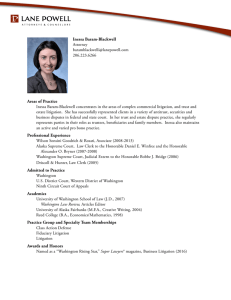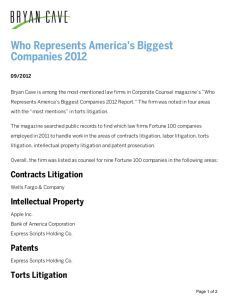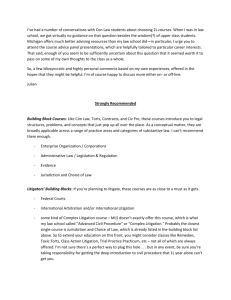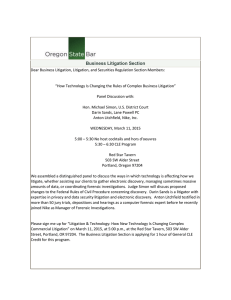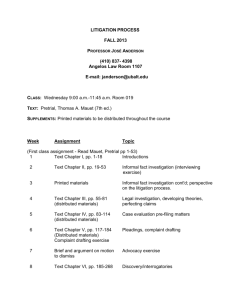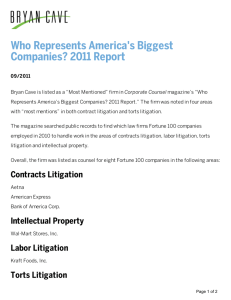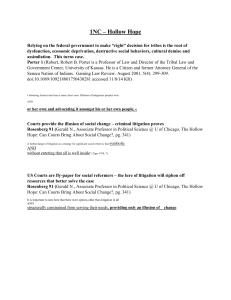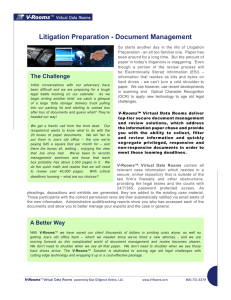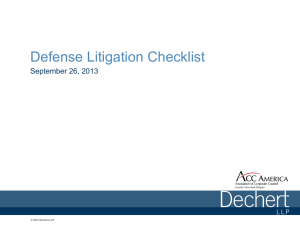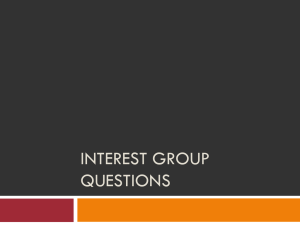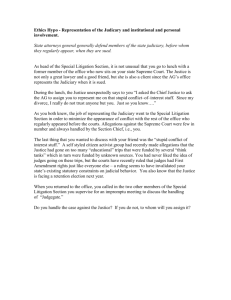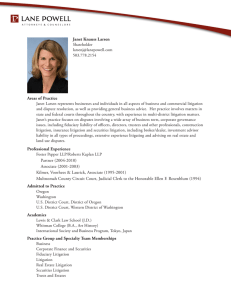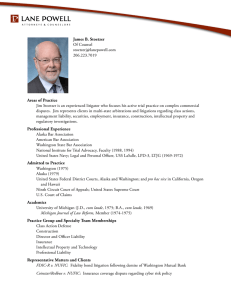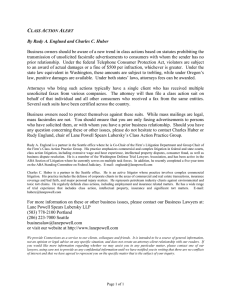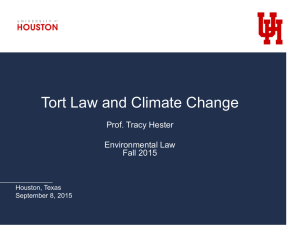Clinics 31 and 35 Our Prescription for Your Legal Health
advertisement
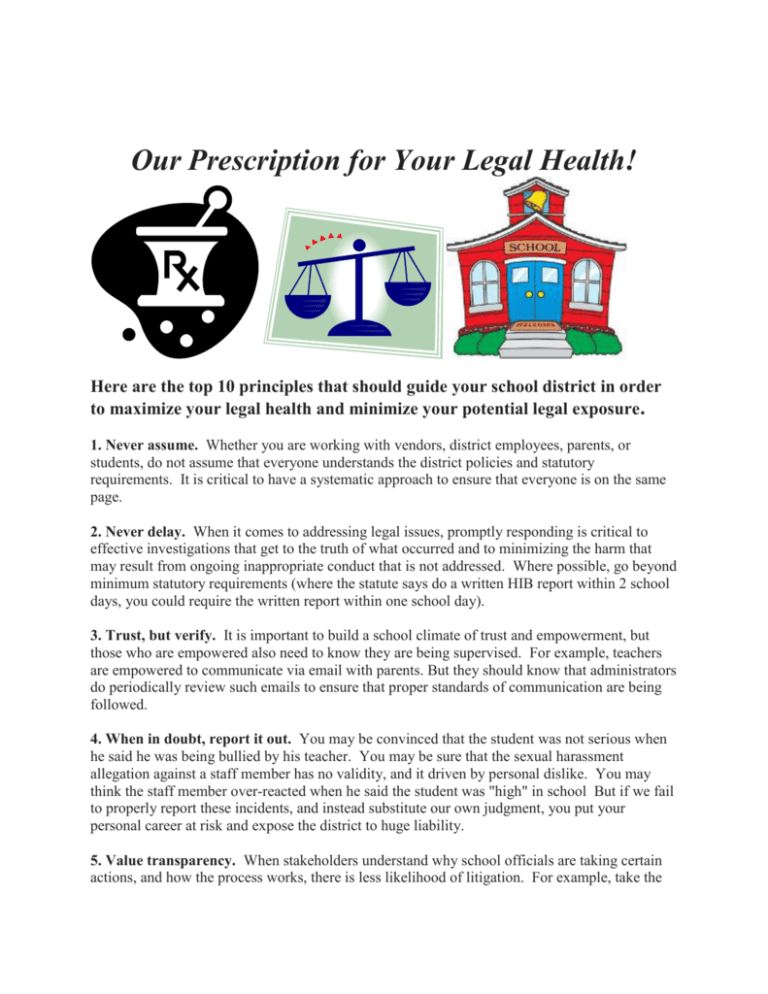
Our Prescription for Your Legal Health! Here are the top 10 principles that should guide your school district in order to maximize your legal health and minimize your potential legal exposure. 1. Never assume. Whether you are working with vendors, district employees, parents, or students, do not assume that everyone understands the district policies and statutory requirements. It is critical to have a systematic approach to ensure that everyone is on the same page. 2. Never delay. When it comes to addressing legal issues, promptly responding is critical to effective investigations that get to the truth of what occurred and to minimizing the harm that may result from ongoing inappropriate conduct that is not addressed. Where possible, go beyond minimum statutory requirements (where the statute says do a written HIB report within 2 school days, you could require the written report within one school day). 3. Trust, but verify. It is important to build a school climate of trust and empowerment, but those who are empowered also need to know they are being supervised. For example, teachers are empowered to communicate via email with parents. But they should know that administrators do periodically review such emails to ensure that proper standards of communication are being followed. 4. When in doubt, report it out. You may be convinced that the student was not serious when he said he was being bullied by his teacher. You may be sure that the sexual harassment allegation against a staff member has no validity, and it driven by personal dislike. You may think the staff member over-reacted when he said the student was "high" in school But if we fail to properly report these incidents, and instead substitute our own judgment, you put your personal career at risk and expose the district to huge liability. 5. Value transparency. When stakeholders understand why school officials are taking certain actions, and how the process works, there is less likelihood of litigation. For example, take the time to explain to parents the HIB investigation process upfront, and make sure they understand why letters are being sent out at a later date. Let the staff member complaining of discrimination understand your process for investigating employment discrimination claims. When a parent asks for student records they are legally entitled to receive, don't needlessly delay and hope the parent drops the request. When you are an open book, there is no need to read between the lines. 6. Be consistent. This seems obvious, but can be challenging to do in practice. Does one school principal have a reputation for being the tough disciplinarian, while another is more compassionate? Do we let personal likability (or lack thereof) influence how we supervise certain staff members? Consistency requires collaboration and a willingness to place greater emphasis on the larger good than personal preferences. 7. Focus on fairness, not popularity. It would be wonderful if all school leaders were loved by all stakeholders at all times. Unfortunately ... But by focusing on fairness, school leaders will engender the respect of key stakeholders, even when making unpopular decisions. 8. If it isn't documented, it didn't happen. We are all busy, and documentation can seem like a tedious task. But it is often the most crucial aspect when litigation does arise. Is there a record of the verbal reprimand you say you gave to a staff member? How do we know whether you thoroughly investigated that affirmative action complaint? Documentation can take many forms, from formal memos in personnel files to memory aid notes. But lack of documentation leaves the door open for others to tell their version of a story, and creates added challenges when memories fade. 9. Constantly assess. You have in place wonderful school district policies that are completely aligned to all legal requirements. That's nice, but are they actually working? Without a strong commitment to data analysis, significant legal problems may arise. For example, the USDOE has pointed to data showing that minority students face disproportionate student discipline, even though most school districts have facially neutral discipline policies. If we don't analyze the data and address such disparities, it may appear as if you are indifferent or even condone differential treatment. 10. Respect goes a long way. We only have one chance to make a first impression! By being respectful and empathetic to the concerns of all stakeholders, we show others that we share common goals. For example, a demanding parent of a special education student may make unrealistic demands, but is acting out of love and concern for her child. But acknowledging where the parent is coming from, and focusing on common goals for the child, the parent is likely to be more open to alternative approaches to achieving those goals. BONUS TIP: What doesn't kill us makes us stronger! Despite all of our best efforts, and following all of the principles outlined above, there are times where school districts will face significant legal challenges through no fault of their own. Take solace in the fact that you are acting with everyone's best interests in mind, and learn to accept that litigation may be unavoidable. At least you will have put yourself in the best possible position when it comes. And hopefully you will come out stronger on the other side!
